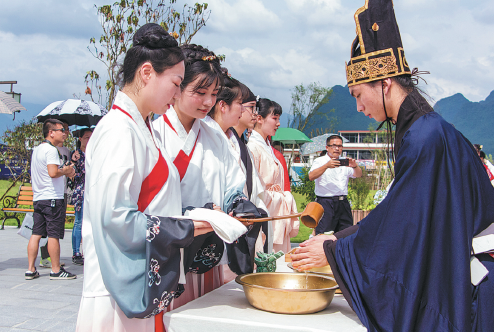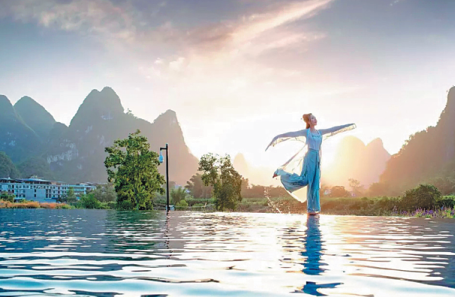Green gems shine


Fisherman Huang Quande skips down the cliff to the riverside, hopping onto his bamboo raft before launching it from the shore within seconds.
Two cormorants, one of them taking a quick dip in the crystal-clear waters, move to perch comfortably behind their owner.
The trio glides swiftly across the smooth-flowing waterway, framed by misty karst mountains and lush bamboo groves.
The scene is picture-perfect-exactly like the iconic image on a 20-yuan bill.
Huang, 93, and his cormorants have become a must-see attraction on the Lijiang River in Xingping town of Guilin, in the Guangxi Zhuang autonomous region, one of China's top scenic spots.
Since his teens, he has been practicing the traditional cormorant fishing method-which trains the birds to hunt with snares at the base of their throats that stop them from swallowing larger fish-even as growing numbers of visitors have made him a celebrity at home and abroad.
"There have been changes through the years, including improvements in the environment. But we still enjoy our traditions here," Huang says.
From pristine landscapes to culturally rich communities, Huang symbolizes one of the best attractions that Guilin has to offer as it leverages its global tourism pioneer position toward green cultural development.
Guilin's karst terrain, part of Guangxi's world heritage site listing, has inspired traditional Chinese landscape painters for centuries with the Lijiang River complementing the breathtaking mountain sights.

The local authorities have been banking on the protection and promotion of the river and its environs in recent years amid increasing development. Recognizing the river's source reliance on rainwater and plugging seasonal low water level risks, Guilin city has invested more than 6 billion yuan ($915.6 million) to boost ecological water replenishment projects in Lijiang's upper reaches. They aim to better regulate the drainage basin, maintain the natural surroundings and improve river navigation.
Wang Zixi, head of the Guilin tourism bureau, says the city is moving beyond the difficulties posed by the COVID-19 pandemic and is tapping demand from home and abroad with competitive and sustainable products and services.
"We're already recording impressive domestic recovery in the cultural tourism sector. Guilin will continue to leverage its physical and cultural advantages to develop tourism management and facilities," Wang says.

































